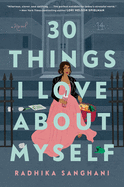
| Publisher: | Berkley | |
| Genre: | Women, Cultural Heritage, Humorous, General, Fiction | |
| ISBN: | 9780593335048 | |
| Pub Date: | January 2022 | |
| Price: | $16 |
| Fiction |
by Radhika Sanghani
An exuberant family drama packed with humor and set in the English city of Leicester, 30 Things I Love About Myself opens with a scene inside a jail cell where, by virtue of a comedy of errors that started with a craving for falafel, the protagonist finds herself on the eve of her 30th birthday.
Nina Mistry is a free-spirited, chocolate-loving journalist who is stuck both professionally and in her personal life. A sensual, earthy Taurus, Nina just broke up with her fiancé. Her perfectionist mother doesn't understand Nina, her brother is struggling with debilitating depression and there is a gaping hole in her British Indian family left by a father who took his own life when Nina was a child.
Just when she feels like giving up, a book serendipitously falls into Nina's lap that promises to transform her life. The book, How to Love Yourself (and Fix Your Shitty Life in the Process), sets her on a rollicking journey of self-discovery that involves yoga, astrology, a solo romantic dinner date and mind-blowing tantric sex, all in the service of falling in love with herself, body and soul.
Radhika Sanghani (Virgin; Not That Easy) deploys both comedy and compassion to draw readers into Nina's narrative, an uplifting, entertaining story inspired by the author's own transformative self-love journey. Readers will enjoy rooting for Sanghani's authentic and memorably portrayed protagonist, a young woman whose family struggles represent real-life issues that are often considered taboo in immigrant communities where the pressure to succeed can be overwhelming. --Shahina Piyarali, reviewer

| Publisher: | University of Iowa Press | |
| Genre: | Short Stories (single author), Fiction | |
| ISBN: | 9781609388133 | |
| Pub Date: | December 2021 | |
| Price: | $16 |
| Fiction |
by Cara Blue Adams
Cara Blue Adams's debut story collection, You Never Get It Back, is a modern look at one woman's coming-of-age experience, notably tinged with the gradual loss of youthful optimism and expectations.
Beginning at the turn of the millennium, narrator Kate stumbles through new adulthood. She is often observing her life from above, not present or engaged but distant, judgmental. This occasional disconnect is reflected in the author's choice to present the stories from various points of view, usually in third person, but sometimes second person.
While the baker's dozen individual stories are markedly different, they are all characterized by a growing patina of disillusionment, grief or ennui. Kate writes to the much older professor with whom she had an affair; recounts a night out with a friend's ex that ends in sexual assault, which she refuses to name as such; and meets an elderly painter losing his sight while she attempts to write at an artists' residency. The stories are linear, following Kate from her early 20s to her mid-30s, but Adams leaves gaps of months or years between them, letting readers wonder about these stretches of time.
Kate's love and professional lives are gray, muddy in the way real life tends to be. Readers will sense that she wants nothing so much as for someone to tell her what to do, what will--finally--make her happy. Readers will easily connect to Kate's confusion, yearning as she does for answers and finding few. --Suzanne Krohn, librarian and freelance reviewer

| Publisher: | Grand Central Publishing | |
| Genre: | Family Life, General, Literary, Suspense, Thrillers, Fiction | |
| ISBN: | 9781538711514 | |
| Pub Date: | January 2022 | |
| Price: | $29 |
| Fiction |
by Noah Hawley
High-octane anxiety is the prevailing emotion in Noah Hawley's much-anticipated sixth novel, Anthem. Large-scale catastrophe, both human and environmental, is the backdrop against which its ingenious, action-packed plot lines tangle and merge. With a promise early on that "There is drama. There is catharsis" and characters that brilliantly depict the full moral spectrum of humanity, Anthem is laced with the wickedly dark humor for which Hawley (Before the Fall), the creator, director and producer of the television series Fargo, is celebrated.
Anthem is set in the post-pandemic near future, an apocalyptic American summer in which the forests of Alaska are on fire, a ring of smoke surrounds the Pacific Northwest and ghost sightings are on the increase across the country. A new virus rooted in the United States is raging across the world. Organized into five "Books," Anthem starts "Book 1," Slow Violence, with what is sure to join the canon of iconic opening lines: "The summer our children began to kill themselves was the hottest in history." A suicide epidemic among adolescents has led to frantic parents searching for answers and the president's declaration of a national state of emergency. It's far worse than a pandemic because there's no inoculation against "an act of collective surrender" by youngsters who have lost faith in their parents' moral authority and given up on the future.
Liberals blame the suicide epidemic on environmental toxins, while conservative talking heads deny there is a suicide epidemic at all. Civic discourse in Hawley's vividly wrought America has reached a boiling point; dark money and fringe ideologies steadily gain mainstream political influence and revolutionary fervor, fanned by gun-toting vigilantes dressed as clowns hissing across the land. America is having a nervous breakdown.
Meanwhile the stock market still rises; Starbucks introduces a countdown clock not to the end of world but to the return of Pumpkin Spice Latte; and a conservative New York judge, Margot Burr-Nadir, is nominated to the Supreme Court by a liberal, compromise-driven president eager to build coalitions and mend democratic institutions damaged by the destabilizing, rage-fueled actions of the president's predecessor, the God King, who was "banished to Florida to glower and boil."
At the heart of the novel is Simon, a teenager utterly consumed by existential anxiety. His father is CEO of the largest manufacturer of highly addictive prescription opiates. Simon's sister took her own life by overdosing on the pills, a rebuke to her father's greed and moral bankruptcy. The drug hums throughout the background of Anthem, a reminder of its insidious presence in American life.
Simon is on his own drug regime as a patient at the Float Anxiety Abatement Center outside Chicago: "These days when he thinks about happiness and contentment he thinks in terms of milligrams." Simon befriends another patient, Louise, for whom obsessive cleaning helps keep at bay the horrors she experienced at the hands of an evil Jeffrey Epstein-like figure known as the Wizard. The Wizard, a personification of our culture's worst excesses, is kept well supplied with his drug of choice--young girls--by a man known as the Troll.
A third patient, the Prophet, persuades Simon and Louise to escape from the anxiety center and set off on a quest to vanquish the Wizard and build a new city, Utopia, based on a collective system of sharing resources and valuing all life. Adults, power hungry and ignoring the impending destruction of the earth, have lost their way, he preaches. Children must start over and break the cycle of planetary collapse. Simon, the Prophet says, is the one chosen by God to lead the mission, inspiring in the anxious young man an uncertain but hopeful sense of purpose.
Meanwhile in Austin, Tex., Judge Burr-Nadir's estranged daughter, Story, and her boyfriend, Felix, embark on a road trip to rescue Felix's sister, Bathsheba, from the Wizard's compound in West Texas--an expertly crafted parallel plot that will bring readers to the edge of their seats. Story and Felix eventually join forces with Simon, Louise and the Prophet, who have escaped the anxiety center and picked up a curious, but not to be underestimated, cavalry of armed adolescents to help execute the compound attack.
Hawley, a confident and polished writer, has crafted an explosive, multi-genre American novel, offering entertaining cultural commentary as well as intellectually courageous observations on empathy, politics and corruption. At the same time, Anthem is, at its core, a good vs. evil morality tale shedding light on uncomfortable truths about mankind's role in its own erasure. Like the fires raging uncontrolled across the country, Hawley's plot swallows unsavory characters and shifts gears after a thrilling climax, forcefully recalibrating the landscape upon which Simon, Louise, the Prophet and others will have to build their vision of Utopia. The author leaves readers with hope that humankind will, in fact, be rescued from itself. --Shahina Piyarali
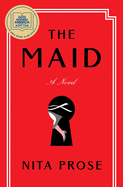
| Publisher: | Ballantine Books | |
| Genre: | Mystery & Detective, Crime, Domestic, Traditional, Literary, Thrillers, Fiction | |
| ISBN: | 9780593356159 | |
| Pub Date: | January 2022 | |
| Price: | $27 |
| Starred | Mystery & Thriller |
by Nita Prose
Molly Gray likes things "simple and neat." She sees "dirt where others don't." This unusual 25-year-old, perfection-seeking hotel maid stumbles upon a murder in The Maid, an inventive and uplifting first mystery by Nita Prose.
Molly, who lives "largely invisible," is socially inept and limited in her fundamental understanding of people. This doesn't hinder the great pride and satisfaction she derives in working as a maid at the Regency Grand, an elegant five-star boutique hotel in an unnamed city. Molly's life and her meticulous, dedicated work ethic were shaped by her grandmother, who raised Molly under a strict moral code. Now that "Gran," her wise touchstone, has died, single Molly struggles to navigate life alone and pay the bills and rent without Gran's help and support.
Molly's tidy world is thrown topsy-turvy when she cleans the room of the Blacks, a rich and famous power couple, good tippers who frequent the hotel. When Molly finds Mr. Black dead, she becomes entangled in a murder investigation where those in her orbit at the hotel suddenly reveal secret, disingenuous motives. Will Molly root out the killer?
The story, set over five days in Molly's life, delivers a delightfully crafted, suspenseful plot and a colorful supporting cast comprised of both the caring and nefarious. However, it's the pure, learning-as-she-goes charm and naiveté of Molly and her inimitable narrative voice--the truth of her lovably eccentric old soul--that readers will not soon forget. --Kathleen Gerard, blogger at Reading Between the Lines
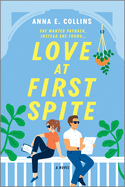
| Publisher: | Graydon House | |
| Genre: | Women, Romantic Comedy, Romance, Coming of Age, Workplace, Fiction | |
| ISBN: | 9781525899799 | |
| Pub Date: | January 2022 | |
| Price: | $15.99 |
| Romance |
by Anna E. Collins
Love is sweet, but revenge on a cheating ex is even sweeter in Love at First Spite, a fun and flirty first novel by Anna E. Collins.
A month before their wedding, Dani Porter--a 30-something interior designer living in Seattle, Wash.--catches her fiancé, Sam, in flagrante delicto with the real estate agent in charge of finalizing contracts on a water-view dream home for the soon-to-be newlyweds. Adding insult to injury, Dani then learns that Sam bought the property on his own--only his name appears on the title. This fuels Dani's determination to make Sam pay for double-crossing her. She buys the vacant lot next door and decides to build an obtrusive rental property with the intent to spoil Sam's water view and make his life a living hell.
Dani's revenge plot is supported by her best-friend cousin and a fun-loving, widowed landlady who both encourage Dani to enlist the help of her standoffish, quirky coworker, Wyatt Montego--a handsome, fastidious architect who eats sandwiches with a knife and fork. As Wyatt draws up blueprints, he questions Dani's decisions to diminish privacy for the house next door. Will he learn of Dani's real agenda? And if so, will it change the burgeoning romantic feelings he has for her--and vice versa?
Plotting revenge proves therapeutic for Dani and a cast of memorable supporting characters--but at what cost? Collins's connivingly plotted rom-com will entice readers to root for the pay-out of an enlightened happy ending. --Kathleen Gerard, blogger at Reading Between the Lines

| Publisher: | Knopf | |
| Genre: | Cooking, Vegetarian, Specific Ingredients, Quick & Easy, Natural Foods, Methods | |
| ISBN: | 9780593320327 | |
| Pub Date: | January 2022 | |
| Price: | $35 |
| Food & Wine |
by Anna Jones
In her fourth book, One: Pot, Pan, Planet, English cook Anna Jones (The Modern Cook's Year) continues her mission of "putting plants at the center of your tables" through vegetarian recipes that prioritize local, seasonal ingredients.
Aiming for simplicity, Jones introduces dishes that are mostly simmered in one pot, fried in one pan or baked in one tray. Soups and stews reveal Asian influences like curry and congee. Chickpeas and tofu provide protein; chilies and spices add zing. Jones also highlights favorite vegetables, with 10 brief meal ideas for each. Easy substitutions make any of the recipes vegan.
Ingredients lists appear in a sidebar in a different font from the detailed instructions, which are in bold. The steps are reassuringly straightforward. The clean page layouts include one of Issy Croker's crisp photographs per spread. These generally depict a finished bowl from above, set against a bare kitchen counter or muslin cloth. From zucchini and halloumi fritters to a chocolate, olive oil and rosemary cake, the flavor combinations are enticing.
While some ingredients seem challenging to source (such as curry leaves or rice vinegar), the recipes focus on fresh vegetables. Jones believes people's eating choices are a major way they can respond to the climate crisis, so she offers tips on sustainability--which high-impact ingredients to use sparingly and buy Fairtrade--and ideas for using up leftovers in frittatas and sauces to avoid food waste.
The green approach makes this a perfect resource for eco-conscious eaters who want to choose more plant-based meals. --Rebecca Foster, freelance reviewer, proofreader and blogger at Bookish Beck

| Publisher: | Harper | |
| Genre: | Biography & Autobiography, Rich & Famous, Royalty, Europe, Great Britain - 20th Century, History | |
| ISBN: | 9780062567499 | |
| Pub Date: | January 2022 | |
| Price: | $35 |
| Starred | Biography & Memoir |
by Jane Ridley
Britain's King George V reigned during the most eventful decades of the early 20th century but was often ridiculed by posterity as a "dull and limited" man--a vision historian Jane Ridley (The Heir Apparent) corrects in her exhaustively researched biography George V: Never a Dull Moment.
Piercing the myth of "King George the Dull," Ridley successfully gets under the sovereign's "humdrum exterior" to reveal a simple man who nevertheless successfully navigated the British monarchy through the turbulence of World War I, the Russian Revolution and rise of Bolshevism, the collapse of dynastic Europe, Irish Home Rule and political crises too numerous to count. Indeed, his 25-year reign (1910-1936) "never had a dull moment." Ridley's engaging study also spotlights Queen Mary and the marriage that helped George V so much. Mary provided the calm and secure domestic life George V ached for, which stood in stark contrast to the lifestyle of his philandering and unserious father, King Edward VII ("I'm not interested in any wife except my own," George once declared). A lifelong conservative, George V was always "fighting a one-man war against the twentieth century," at the same time laying the foundations of the modern British monarchy (his adoption of the House of Windsor as the official name of the British Royal Family in 1917 still holds 100 years later).
Ridley's brilliant biography is a benchmark for future historians, revealing a man of deep character who ultimately saved a sclerotic monarchy. --Peggy Kurkowski, book reviewer and copywriter in Denver
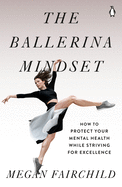
| Publisher: | Penguin Life | |
| Genre: | Self-Help, Personal Growth, Classical & Ballet, Dance, Motivational & Inspirational, Success, Performing Arts | |
| ISBN: | 9780143136040 | |
| Pub Date: | December 2021 | |
| Price: | $17 |
| Psychology & Self-Help |
by Megan Fairchild
Ballet as an art form epitomizes perfection, striving, competition and devotion, and to those outside of its world, its dancers seem to achieve the superhuman on a daily basis. In The Ballerina Mindset, Megan Fairchild, principal ballerina with New York City Ballet, takes readers behind the scenes, not just into the world of dance, but into what it takes to succeed in a mentally, physically and emotionally exhausting career.
Fairchild shares lessons learned over two decades that feel relevant even to non-dancers. She writes about her journey toward managing perfectionism, criticism, self-doubt and anxiety, and how she learned to turn weaknesses into strengths while also embracing that she was enough as a person, flaws and all. She notes the importance of allowing space for failure and of looking beyond career goals.
Fairchild candidly shares her setbacks and the ways in which she reached out for help when needed. She discusses meditation as a tool, and offers reflections on her growth over a two-decade career. Most surprisingly, perhaps, are her ruminations on how stepping away from ballet, either to try new things or to move forward in different stages in her life, eventually strengthened her career.
While focused on the world of ballet, the advice she imparts is universal, conveyed in the tone of a slightly older, slightly wiser friend who wants readers to find a bit of a shortcut through the lessons she learned the long way around. --Michelle Anya Anjirbag, freelance reviewer

| Publisher: | Putnam | |
| Genre: | Exercise, Women's Health, Health & Fitness, General, Popular Culture, Social Science | |
| ISBN: | 9780593188422 | |
| Pub Date: | January 2022 | |
| Price: | $27 |
| Health & Medicine |
by Danielle Friedman
The recreational fitness industry today might be predominantly marketed to and dominated by women, but how did it come to be that way? That is the question multimedia journalist Danielle Friedman explores in Let's Get Physical, an engaging and entertaining examination of the fitness industry from its birth in the postwar era to contemporary times. She astutely covers the cultural challenges associated with the idea of women exercising, like unfounded concerns that strenuous exertion could cause one's uterus to fall out. Friedman addresses gender-based prejudices such as those faced by Kathrine Switzer, the first woman to try to officially enter the Boston Marathon, who was chased down and assaulted by race manager Jock Semple. She also outlines race and class barriers that persist to this day, such as the cost of fitness classes, gyms and studios, and the pervasive whiteness of the fitness industry.
Each chapter takes readers through a particular fitness movement and the women who were its pioneers. Friedman also explores the invention of the sports bra and the rise of women's fitness fashion, and includes an update at the end of the book about where each of these pioneers ended up. She writes, reflecting on this history as a paradigm shift: "when women first began exercising en masse, they were participating in something subversive: the cultivation of physical strength and autonomy." Let's Get Physical details this shift from all angles, celebrating the women who reshaped the modern world along with women's bodies. --Michelle Anya Anjirbag, freelance reviewer

| Publisher: | Putnam | |
| Genre: | Psychological, Women, Suspense, Thrillers, Fiction | |
| ISBN: | 9780593187845 | |
| Pub Date: | December 2021 | |
| Price: | $17 |
| Now in Paperback |
by Allie Reynolds
It seems nothing good can happen in an abandoned ski resort during a snowstorm. In Shiver, the gripping debut thriller by British writer Allie Reynolds, five former competitive snowboarders gather for a reunion weekend at Le Rocher, a secluded spot in the French Alps. They haven't seen each other in more than a decade, but old wounds remain fresh: last time they were at Le Rocher to train for an elite competition, fellow snowboarder Saskia Sparks mysteriously vanished. Each member of the group had a complicated relationship with the hyper-aggressive and possibly sociopathic Saskia--particularly Milla, who serves as the story's no-nonsense narrator and whose drive to win sometimes overrides her basic morality. As the off-season weather turns increasingly hostile, it doesn't take long for the group to realize they've been lured to the resort by someone who knows their secrets--and isn't afraid to seek revenge. Trust among the group withers, and Milla longs for the intimacy she experienced with her former friends as she tries to uncover who could have murdered Saskia, all while concealing her own role in the crime.
An ex-freestyle snowboarder who spent several years traveling internationally, Reynolds writes with the fast-paced intensity of an energy drink-fueled trip down the slopes. Alongside its central mystery, Shiver offers an intimate look at the convoluted relationships of athletes who excel at a sport most people are too cautious even to attempt--including what happens when the truth becomes inescapable, both because of the blizzard and other equally unpredictable forces. --Angela Lutz, freelance reviewer
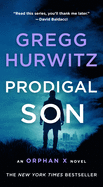
| Publisher: | St. Martin's Press | |
| Genre: | Crime, Suspense, Thrillers, Fiction | |
| ISBN: | 9781250253231 | |
| Pub Date: | December 2021 | |
| Price: | $9.99 |
| Now in Paperback |
by Gregg Hurwitz
Extreme action melded with in-depth character studies punctuate Prodigal Son, Gregg Hurwitz's absorbing sixth Orphan X thriller featuring Evan Smoak, who was abandoned as a baby, then, as a child, recruited into the secret Orphan Program, where he was trained to be an assassin. Leaving the Orphans, Evan reinvented himself as the Nowhere Man, a crime-fighting vigilante for ordinary people in need.
Now retired, Evan wants to lead "an ordinary life, whatever that was." In Prodigal Son, Evan meets a dose of the ordinary with the arrival of Veronica LeGrande, who claims to be his long-lost mother. The skeptical Evan comes to believe Veronica as she recounts details about the circumstances of his birth. Veronica wants a favor: help Andrew Duran, a down-on-his-luck, minimum-wage guard at an impound lot who witnessed a murder. Evan is soon embroiled in a conspiracy involving innovative military technology--and targeted by brother and sister killers.
Prodigal Son spins on sharp, over-the-top action with a sense of believability, including Evan's high-tech weapons, surveillance toys and his state-of-the-art condo. Evan's mad martial-arts skills give him the edge in any fight, no matter how many opponents he faces, but he is no superhero, often getting hurt.
A highlight is how Hurwitz (Don't Look Back) forcefully illustrates the fearless Evan's continued emotional growth. He begins to care about Veronica and Andrew while keeping an eye on Joey, a 16-year-old hacker he rescued from the Orphan Program. Evan also desperately wants to give into his feelings for Mia Hall and her nine-year-old son, Peter, who live in his building.
Prodigal Son is an impressive addition to the outstanding Orphan series. --Oline H. Cogdill, freelance reviewer
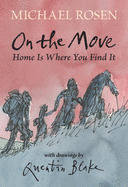
| Publisher: | Candlewick Press | |
| Genre: | Holocaust, Emigration & Immigration, General, Social Topics, Poetry, History, Juvenile Nonfiction | |
| ISBN: | 9781536218107 | |
| Pub Date: | January 2022 | |
| Price: | $17.99 |
| Starred | Children's & Young Adult |
by Michael Rosen, illust. by Quentin Blake
Poet Michael Rosen delves into his affecting family history in his contemplative and compelling collection about migration and refugees, On the Move. Forty-nine of Rosen's poems, evocatively illustrated by Quentin Blake, are arranged in four sections--Family and Friends, The War, The Migrants in Me and On the Move Again--through which Rosen prompts readers to consider the connectedness of one family's experience of the Holocaust to the broader movement of people in crisis worldwide.
Rosen (We're Going on a Bear Hunt) captures his youthful moments in London with a stream of consciousness, memories pouring forth poem by poem, family stories and mundane encounters evoking nostalgia while inviting reader reflection. The former U.K. Children's Laureate juxtaposes the universality of the human experience of migration with an admonishment of xenophobia and persecution: "We say, 'Never again.'/ But/ .../ it can happen again. It does happen again. It has happened again." Rosen arranged previously published works for this collection, which he bookends with a helpful introduction entitled "Migrant Poetry" and backmatter that includes a link to some of his spoken poems.
Blake (The Tale of Kitty-in-Boots) punctuates the anthology with evocative watercolor illustrations. His distinctive, jagged line art conveys a camaraderie and hopefulness among the displaced figures as they move across land and water on double-page spreads with increasingly saturated violet hues. There is a kinetic urgency to Blake's work here, and the atmospheric art complements Rosen's message extremely well. In these honest and pensive poems, Rosen probes his own past to prompt readers to contemplate their own feelings around global displacement. --Kit Ballenger, youth librarian, Help Your Shelf

| Publisher: | Clarion Books | |
| Genre: | Clean & Wholesome, Epic, Fantasy, Mysteries & Detective Stories, Family, Romance, Young Adult Fiction, Action & Adventure, Siblings | |
| ISBN: | 9780358468332 | |
| Pub Date: | January 2022 | |
| Price: | $18.99 |
| Children's & Young Adult |
by Akshaya Raman
Royal siblings hunt for a key to hidden magic in this exhilarating YA fantasy adventure of secrets and betrayals.
Magic is running dry in Ashoka, and what is left won't protect the country against invaders. Thus Vira, now maharani (queen) after her mother's assassination, seeks an item that is fabled to unlock hidden quarries of magic, the Ivory Key. Meanwhile, Vira's sister Riya, who ran away from royal life years ago, wants the Ivory Key to help those on whom Vira has imposed heavy taxes. Ronak is determined to free Kaleb, whom Vira wrongly imprisoned for plotting their mother's murder. The brothers could start a new life and Ronak could avoid being married off by Vira, but in exchange for new identities, Ronak must deliver the Ivory Key to a criminal empire. When the estranged siblings realize their shared goal (though not how each undermines the other), they embark on an impossible journey to recover the key--one during which they must trust each other with their lives.
The Ivory Key, Akshaya Raman's debut, is a dramatic familial saga and action-packed treasure hunt and the first entry in a planned duology. The idea that "the good of the country matter[s] more than family" is pitted against the right to make one's own destiny while a "temple full of magical obstacles," a city buried in a mountain and perplexing puzzles fuel the excitement. Extravagant fashion, exquisite foods and ancient forts inspired by the author's Indian heritage create a deeply detailed world. The Ivory Key hits every much-loved aspect of fantasy. --Samantha Zaboski, freelance editor and reviewer
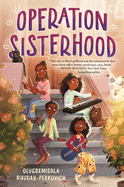
| Publisher: | Crown Books for Young Readers | |
| Genre: | Adolescence & Coming of Age, Family, Social Themes, Blended Families, Juvenile Fiction, Diversity & Multicultural | |
| ISBN: | 9780593379899 | |
| Pub Date: | January 2022 | |
| Price: | $16.99 |
| Children's & Young Adult |
by Olugbemisola Rhuday-Perkovich
Operation Sisterhood by Olugbemisola Rhuday-Perkovich is a charming story about sisterhood and family.
Eleven-year-old Nigerian American Bo Marshall, short for Tokunbo, lives with her Mum, Lola. Life is great, even in a tiny one-bedroom New York City apartment. Mother and daughter do everything together, and Bo particularly enjoys baking, cooking and taking trips to the West African market. But everything changes when Mum gets engaged to her boyfriend, Bill, and she and Bo move from their apartment in the Bronx to his large Harlem brownstone inhabited by a rather eclectic collection of family members. There's Bill's daughter, Sunday; Mama Hope and Papa Charles and their twin girls, Lil and Lee; and an ever-growing number of pets (two cats, a dog, a bearded dragon, a turtle and a coop full of hens). In the blink of an eye, Bo's family quadruples and she wonders how to adjust. The perfect opportunity to collaborate with her new sisters arises with "Operation Wedding Reception Party," a proposed block party, potluck and talent show to celebrate Lola and Bill. To help make the party a success, Bo will have to learn how to be a sister and team player while bringing her own special abilities to the task.
Broken up into short chapters, this middle-grade novel touches topics such as sisterhood, individuality, loyalty and family, both the ones you're born into and the ones that you create. Rhuday-Perkovich (Two Naomis) tells the story through the eyes of an endearing tween trying to find her place in a new and chaotic blended family. --Natasha Harris, freelance reviewer